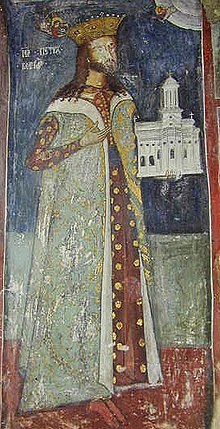
Back Раду VII Паисий Bulgarian Radu VII Paisie French ראדו פאיסיה HE VII. Radu havasalföldi fejedelem Hungarian Radu VII Paisie Italian Radu Paisie Polish Radu Paisie da Valáquia Portuguese Radu Paisie Romanian Radu VII. Paisie Slovenian
| Radu VII Paisie (Petru I) Radul voievod(a) (Радул воєвода) | |
|---|---|
 Radu Paisie as ktitor. David and Radoslav's fresco in the infirmary of Cozia Monastery | |
| Prince of Wallachia | |
| Reign | June 12, 1535 – February 1536? |
| Predecessor | Vlad Vintilă de la Slatina |
| Successor | Barbu Mărăcine? |
| Reign | February 1536?–June 1539? |
| Predecessor | Barbu Mărăcine? |
| Successor | Șerban of Izvorani (as ispravnic) |
| Reign | September 1539 – early 1544 |
| Predecessor | Șerban of Izvorani (as ispravnic) |
| Successor | Stroe Florescu and Laiotă Basarab |
| Reign | 1544 – February 1545 |
| Predecessor | Stroe Florescu and Laiotă Basarab |
| Successor | Mircea the Shepherd |
| Born | Petru (Пєтрȣ) ca. 1500 Argeș County? |
| Died | unknown date Alexandria or the Sinai, Egypt Eyalet |
| Spouse | Stana (d. ca. 1535) Ruxandra (m. ca. 1535; d. ca. 1572) |
| Issue | Marco Vlad Pătrașcu the Good? Maria Cârstina |
| Dynasty | Drăculești? |
| Father | Radu the Great? Stanciul? |
| Religion | Orthodox |
| Occupation | Fishmonger, monk |
| Signature |  |
Radu VII Paisie, officially Radul voievod(a) (Church Slavonic: Радул воєвода; Greek: Ῥαδουλ-Βοδα, romanized: Radul-Voda),[1] also known as Radu vodă Măjescul, Radu vodă Călugărul, Petru I, and Petru de la Argeș (ca. 1500[2] – after 1545), was Prince of Wallachia almost continuously from June 1535 to February 1545. A man of uncertain origins, he depicted himself as an heir to the House of Basarab and the Drăculești: the son of Prince Radu the Great and half-brother of Vlad Vintilă and Radu of Afumați. The scholar Nicolaus Olahus partly supported this account and further claimed that Paisie was his own cousin. The descent is endorsed by some modern historians, whereas others suggest that Paisie was a regular member of the boyar class, or even a fishmonger. He is known to have been a monk of the Wallachian Orthodox Church before his coronation.
Paisie took the throne as a boyar favorite in the wake of Vlad Vintilă's assassination. Despite his immediate homage to the Ottoman Empire, which exercised suzerain powers over Wallachia, some records suggest that he was chased out by the pretender Barbu Mărăcine, and possibly also maimed, by having his nose partly slashed, in early 1536. He returned to the country, possibly supported by the Eastern Hungarian Kingdom, and staged a bloody repression. He then reaffirmed his fealty to the Ottoman Sultan, Suleiman the Magnificent, and contributed to the Suleiman's expeditions into Hungary. His repression of the boyars sparked new rebellions, which created two other brief interregnums: in 1539, Șerban of Izvorani established himself as regent; for two months in early 1544, Stroe Florescu and Laiotă Basarab took the capital, Târgoviște, but were defeated by Paisie at Fântâna Țiganului.
Possibly as thanks for their military support, Paisie ceded to the Ottomans the port of Brăila. Instead, following his raids into Transylvania, he was confirmed personal ownership of two inland citadels, Vințu de Jos and Vurpăr. Despite relying on Suleiman's support, Paisie also continued to entertain notions of emancipating Christendom and the Balkans from Ottoman rule, and in 1543 even signed to an alliance with the Habsburg Kingdom of Hungary. Rumors of this policy shift, and the intrigues of another claimant, Mircea the Shepherd, eventually caused Suleiman to depose him. This was done with careful planning, leaving Paisie unable to react before Mircea was in full control of Wallachia. Paisie was eventually exiled to Egypt Eyalet, where he spent the remainder of his life.
His two attested sons, including his co-ruler Marco, were either slaughtered by Mircea's family or Islamized at Suleiman's court. A possible third son, Pătrașcu the Good, came to rule Wallachia in the 1550s, between two of Mircea's reigns. This lineage would make Radu Paisie the grandfather of two other Princes, Petru Cercel and Michael the Brave. In cultural history, Paisie is remembered as the patron of Church Slavonic and one-time sponsor of the printer Dimitrije Ljubavić; as well as being the monarch who completed monastery complexes at Argeș, Cozia, Dealu, and Tismana. Through such enterprises, he and Marco elevated themselves to the fictional status of Eastern Orthodox protectors, contrasting their real-life subjugation to Suleiman.
© MMXXIII Rich X Search. We shall prevail. All rights reserved. Rich X Search